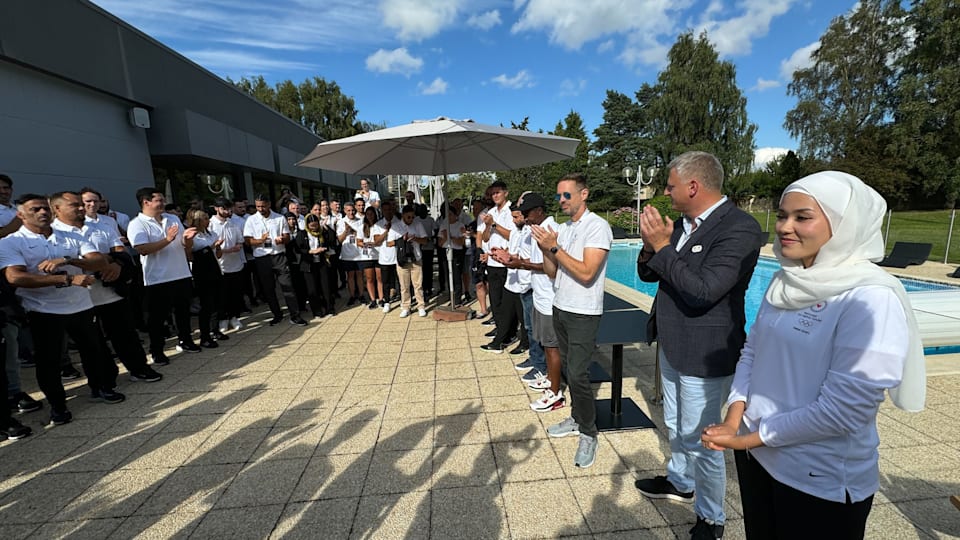IOC Refugee Olympic Team gather for Paris 2024 camp in historic Bayeux: "It's a lesson in hope"

Eighty years after becoming the capital of liberated France at the end of WWII, Bayeux is reliving the atmosphere of freedom, peace and hope of those days.
This historic town in the northern region of Normandy was chosen to host the IOC Refugee Olympic Team camp as they prepare for the upcoming Paris 2024 Games.
Athletes, coaches and staff travelled from all over the world to gather for this bonding opportunity, and they will stay together until departing for the Olympic Village on Thursday (18 July).
“I think it's amazing, isn't it? Finally, we get to meet each other—everyone from different countries, speaking different languages, with different personalities,” boxer Cindy Ngamba said after her arrival.
Ngamba is one of the 37 athletes who were selected for the team.
"Everyone's a bit shy on the first day, but I think by the end of the last day, we'll all become like a big family and get used to each other, she added.
"So when we do get to the Village, it will feel like muscle memory, as they say.”
Badminton player Dorsa Yavarivafa arrived in Bayeux after a 20-hour flight from Kuala Lumpur, Malaysia: “When we arrived, they greeted us so nicely – she said - After that, I went to my room, I changed and did some photo shoots, which were very fun as well. The whole team is here, and I'm just so excited and nervous for my Games. But more excited, everything is perfect.”
Given its understanding of the effects of war and the struggles of refugees, Bayeux was seen as the ideal place to unite the team before the Olympic Games.
“Here, 80 years ago, we experienced oppression, rationing, the difficulty of getting food, and a strong limitation of our freedom. And you see, 80 years later, the story is rewritten differently, and I think it's really a nice note of hope,” said deputy mayor Arnaud Tanquerel.
“Today, to allow these refugee athletes to be able to be in Bayeux and walk through history, to see that only 80 years ago, this city was completely oppressed, well, I think it's a great life lesson. It's a great lesson in hope.”
The town provides the athletes with top-level training facilities located around their hotel, including an athletics track, a swimming pool, a badminton court, and a hall for practising combat sports and martial arts.
“This city has a great history and it was nice to train on the track, even if I was without a training partner. The atmosphere is very nice,” said 800m runner Musa Souleimani.
IOC Olympic Refugee Team Chef de Mission Masomah Ali Zada (on the right)
For some athletes of the team this is the second experience in a pre-Games camp after the one in Doha three years ago.
“Ahead of Tokyo, we all had our individual rooms and there was less contact with other teammates,” shared judoka Nigara Shaheen. “Now, I'm actually glad that we are sharing rooms. I see that it's a friendlier environment among the athletes, and I hope that we create such a strong bond and go as one team into Paris, cheering for each other.”
On the second night of the camp, Shaheen took part in a spontaneous dancing contest led by fellow Iran-born athletes Saeid Fazloula and Mohammad Rashnonehzad, which gradually involved more team-mates despite the language barrier.
“We speak different languages but most of us share a complicated past and it’s easy to communicate in the end, we don’t need too many words” said Eritrea-born Tachlowini Gabriyesos, who was the team's flag-bearer at Tokyo 2020 in 2021.
“We are very strong people,” he added, underlying the need to change the narrative about the more than 100 million displaced people around the world.
A message passionately reiterated by other members of the team.
“It’s really important to share this story and show the world that we can be an asset, not always a liability,” concluded Shaheen. “So I think this team is really important, and we all are symbols of hope.”